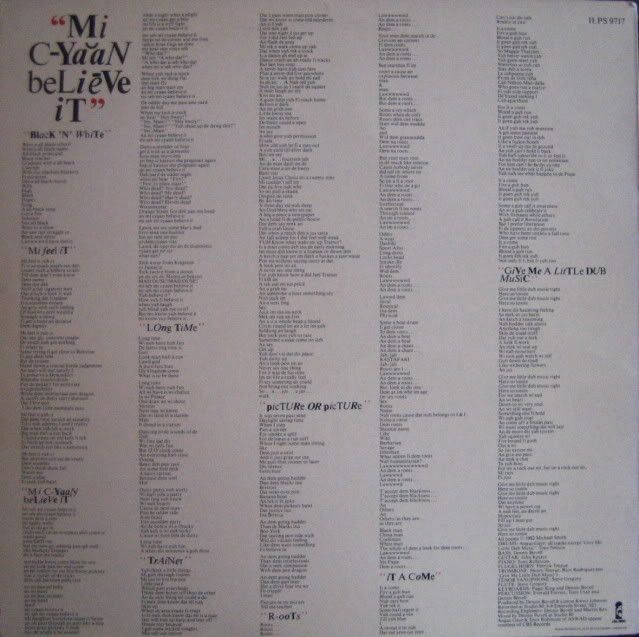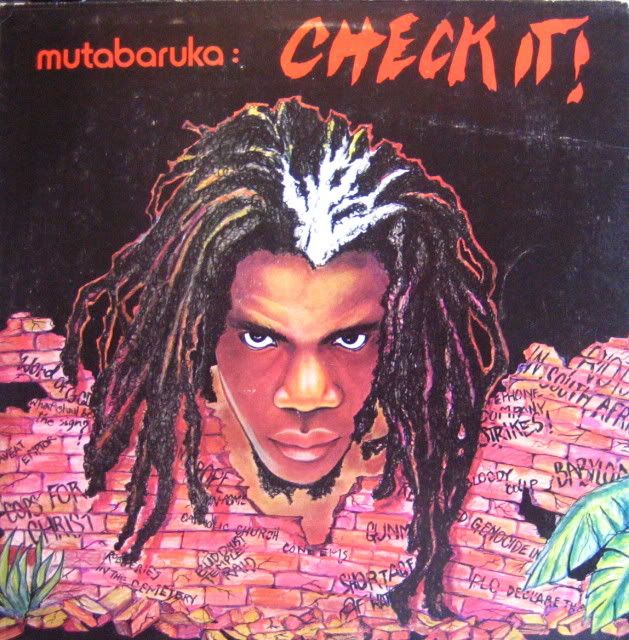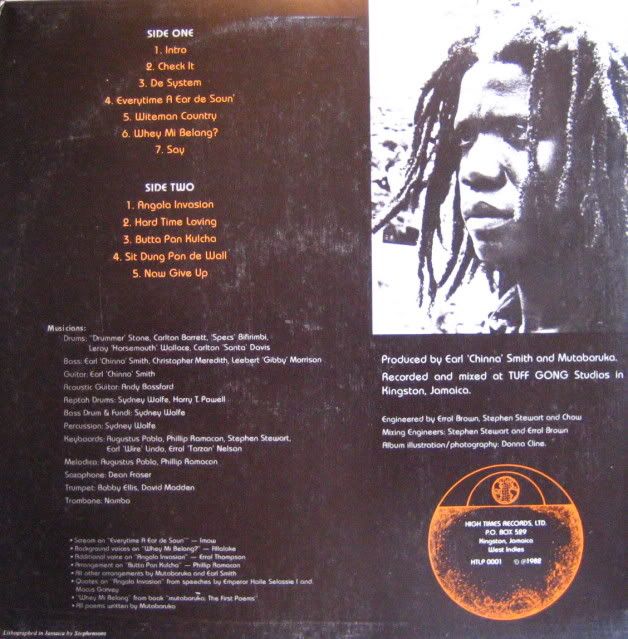

Black And White / Mi Feel It / Mi Cyaan Believe It / Long Time / Trainer
Picture Or Picture / Roots / It A Come / Give Me A Little Dub Music
Absolutely awesome debut LP release from the late Michael Smith recorded in London and produced by Lintern Kwesi Johnson and Dennis Bovell. A fine record for sure and one which is well worth a listen if you enjoy political tinged dub rants…
Text below courtesy of reggaenews.co.uk
At around 11am on the 17th August 1983, 96 years to the day after the birth of Marcus Garvey, the 28-year-old Jamaican poet Michael Smith fell into an argument with three men in Stony Hill. The previous evening he had heckled the minister of education at a political meeting, and the trio who approached him were JLP activists, angered by his words. In the struggle that followed one of the men struck him with a stone and the blow lead to his death. Friends and colleagues of Smith know the names of those involved, yet no witnesses were prepared to come forward and so no case against them could be made.
Of course, politically motivated violence and young men cut down before reaching their full potential were sadly nothing new in Jamaica at the time. But what made this loss all the more tragic was that just one year earlier Michael had released his first LP Mi Cyaan Believe It on Island Records. According to the record’s co-producer Linton Kwesi Johnson, Island’s owner Chris Blackwell was reluctant to market a second dub poet on the label and, consequently, Island did little to promote the album. A quarter of a century later, this rare and conceptual set remains one of the strongest debuts Jamaican music has ever known. One can only speculate as to what Michael could have achieved had he lived.
The record begins with a short spoken word piece Black And White, where Smith (or perhaps one of the myriad characters he plays) describes his background “an all black school with an all black name… black principal, black teacher…” and experiences “went to a show and saw our struggles in black and white” culminating in a deep throaty rumbling “lawrd have mercy!” Compared to the grounding, immutable voice of LKJ, which serves as a constant in his music, Smith’s range of vocal expression and fearlessness in using it are remarkable things to hear.
A trained actor at the Jamaican School Of Drama, Smith’s many voices populate the album creating some disorientating changes in volume and mood. On the title track, another spoken poem, he takes the flabbergasted high-pitched persona of an older Jamaican, incredulous at the cruel and unusual permutations of human life in poverty. Yet at other times in the piece he becomes the low, mocking tones of people this protagonist has overheard, even becoming the rapid-fire patter of a crowd responding to a fire in Orange Street.
The players used on the project were a UK reggae super group comprised of Aswad and the Bovell band. Michael’s voice matches their work at every step, intermingling or contrasting as and when the record’s theatrics require. Over the dynamic, building Mi Feel It, with Dennis Bovell’s slap bass coming in off the beat, a reverb soaked Smith broadcasts his savage critique of a system that fails young people with a strident urgency. On the slow brooding Trainer he radiates quiet, guttural malevolence; It A Come is limitless in its breezy defiance (with its nonchalantly dismissive line “Maggie Thatcher? You better watch yah!”); while for Roots he spits forth an unearthly, Antinomian stream of consciousness over a mixture of military and Grounation drumming, stretching his throat to almost unbearable lengths (both for him and us!). During the catchy, danceable Long Time, and the swinging, heavily LKJ influenced Picture Or Picture he pares down his delivery to a Linton style stoicism. But where his themes of youthful pleasure seeking in a world with no prospects are akin to his mentor’s, the patois is thicker, the language tricksier, thornier, more oblique – without the roadmap of socialism (Linton describes Michael as “an anarchist”) to demand conformity, plain speaking and a common destination.
This is not music you would hear or play at a sound system. Nor is it an album you’d put on to cure the blues or relax after a hard day’s graft. This is a self-contained work of art – one that constantly challenges and reveals new depths – that stands up and holds its own against any other you may care to mention. And it is a rank injustice that Michael never had the chance to create anything like it again.


Intro / Check It / De System / Every Time I Hear De Sound / Whiteman Country / Whey Mi Belong / Say
Angola Invasion / Hard Time Loving / Butta Pan Kulcha / Sit Dung Pon De Wall / Naw Give Up
The second LP uploaded in this post relating to Dub Poetry, the debut release by Mutabaruka which is also top notch.
Text below courtesy of allmusic.com.
Mutabaruka’s poems have given voice to a nation and helped forge an entirely new genre of music, dub / rhythm poetry. Revolutionary, fiery, scathing, and stinging, Mutabaruka’s words are as potent on paper as on vinyl or CD, and so the literary community needed to create a new term just for his works — meta-dub.
Born in Rae Town, Jamaica, on December 12, 1952, Allan Hope first realised the power of the word when he was in his teens. It was the ’60s; the Black Power movement was at its height, and numerous radical leaders were putting their thoughts and histories in print. Malcolm X and Eldridge Cleaver formed the roots of Hope’s own aspirations, although his initial career choice was far removed from their paths. Leaving school, the young man apprenticed as an electrician, and took a job at the Jamaican Telephone Company. Hope was already writing, however, and in 1971 he quit his job to pursue his craft full-time. He moved away from the hustle and bustle of Kingston out to the quiet of the Potosi hills, in the parish of Saint James. Not long after, one of his poems was accepted by Swing magazine and from that point on, they would regularly publish his work.
In 1973, Hope formed the band Truth, his first attempt to combine his words with music. By now, the poet had converted to Rastafarianism and taken the name Mutabaruka. Not a word, but a phrase, mutabaruka comes from the Rwandan language and translates as “one who is always victorious.” Even as roots was taking hold, Truth did not find a following. However, Mutabaruka was finding fans in the literary world after the publication of his collection, Outcry, in 1973. The following year brought further recognition with the poem “Wailin’,”dedicated to Bob Marley, and written around Wailers song titles. Two years later, Sun and Moon, a shared volume of poetry with Faybiene, arrived to much acclaim. In 1977, Mutabaruka once again turned to the stage, and gave several live performances. Joined by the nyabinghi-fueled group Light of Saba, the poet recorded a version of his poem “Outcry” the next year, and found himself with a Jamaican hit. Meanwhile, guitarist Earl “Chinna” Smith had launched his own High Times label as a home for deep roots music, and swiftly signed the poet. Mutabaruka’s star was rising, and his appearance at the National Stadium in Kingston this same year was a smashing success.
Over the next few years, he cut a clutch of singles for High Times, and received even further literary acclaim in 1981 with a new volume of poems, The Book: First Poems. That same year, Mutabaruka had a hit with the single “Everytime I Hear De Sound,” while his fiery debut at Reggae Sunsplash was captured for posterity for a live album released in 1982. It was this performance that brought Mutabaruka to international attention, and guaranteed return appearance at the festival over the next two years.
His debut studio album, Check It, was also released in 1982, a dub classic with the poet accompanied by Smith’s exquisitely roots guitar. Studio musicians at Tuff Gong Studio that helped to lay the foundations of the tracks for Mutabaruka to rant over included Leroy ‘Horsemouth’ Wallace, Carlton ‘Santa’ Davis, Sydney Woolfe, Augustus Pablo, Earl ‘Wire’ Lindo, Dean Fraser and Bobby Ellis.
1985 saw another successful return to Reggae Sunsplash and a project with the American Heartbeat label, overseeing the compilation of the dub poetry album Work Sound ‘Ave Power: Dub Poets and Dub. A dub accompaniment followed, remixed by Scientist, along with a second dub poetry set, Woman Talk: Caribbean Dub Poetry, this time exclusively featuring women dub and rapso poets. Mutabaruka also struck a distribution deal with the American RAS label, and cemented the partnership with the ferocious The Mystery Unfolds album in 1986. Self-produced and featuring a host of guest musicians and vocalists, including Marcia Griffiths and Ini Kamoze, Mystery was totally uncompromising. Amidst a host of tough tracks was “Dis Poem,” a number meant to puncture not only the listener’s expectations, but the poet’s pretensions as well. One of Mutabaruka’s most entertaining, yet thought-provoking poems, it would later be included in the definitive The Routledge Reader in Caribbean Literature.
dan i
August 1, 2009 at 11:37 amMarvellous! Two absolutely classic albums. Michael Smith’s in particular, backed by Dennis Bovell’s Dub Band – awesome! Just need the Word Sound & Power/ Dub Poets Dub albums to complete the set.
For anyone who hasnt heard Michael Smith yet, ah seh, mi cyaan believe it!
dan i
August 1, 2009 at 11:38 amProphets stoned to death – it still happens, believe it yah!
Stewart
August 1, 2009 at 7:29 pmHaven’t heard the Mutabaruka album yet, but I’ve always loved the Michael Smith one. 27 years on from its release date I still listen to reggae music constantly – angry and powerful, it resonates still… 🙂
stig
November 5, 2009 at 12:35 ampriceless! i tried to buy this a couple of years ago, couldn’t find it anywhere, got onto lkj, was told the masters were owned by island records who had no plans to re-release it, despite many requests, tossers!!!finally got a copy about a year ago, one of my only pieces of vinyl now!! a landmark!
dan i
March 25, 2010 at 7:43 amThere is a feature on Michael Smith in John Eden’s new edition of Woofah. Well researched and presented as always, the magazine also covers Tony Thorpe (Moody Boyz), UK Dubplate cutting houses as well as a wide range of dubby/ dubsteppy magic.
For John Eden’s uncarved blog:
http://www.uncarved.org/blog/category/live-reviews/
For Woofah #4:
http://cgi.ebay.co.uk/WOOFAH-4-reggae-grime-dubstep-magazine-dub-NEW_W0QQitemZ230448645955QQcmdZViewItemQQssPageNameZRSS%3AB%3ASRCH%3AGB%3A101
John Eden
March 25, 2010 at 12:14 pmThanks Dan – glad you like it!
dan i
March 27, 2010 at 2:40 amAnother great read John. Especially Tony Thorpe, have loved some of his music for a long time so good to get an in depth interview.